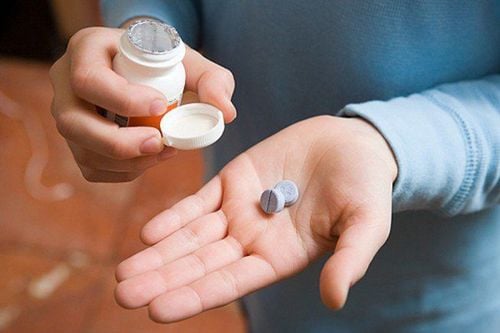This is an automatically translated article.
The article is professionally consulted by Master, Doctor Nguyen Thi Thanh Thuy - Endocrinologist - Dialysis - Kidney Transplant - Department of Examination & Internal Medicine - Vinmec Central Park International General Hospital.Urinary tract infection is a common disease, causing discomfort and can have serious consequences if not examined and treated promptly. This article aims to provide some information and methods to prevent urinary tract infections.
1. What is a urinary tract infection?
A urinary tract infection (UTI) is an infection of any organ in the urinary system, including the kidneys, ureters, bladder, and urethra. Most infections involve the lower urinary system – the bladder and urethra.Overall, 40% of women are likely to get a urinary tract infection at some point in their lives. In Singapore, statistics show that 4% of adult women suffer from urinary tract infections, and this rate increases to 7% in their 50s. Adult women are at twice the risk of UTIs. 30 times men, with almost half of them having a urinary tract infection once in their life. Statistics show that one in three women will have a urinary tract infection by the age of 24. Females who have had sex are most susceptible to urinary tract infections. Adult cases of this disease are seen in the elderly and in patients requiring urinary catheterization.
2. What are the causes of urinary tract infections in women?
Urinary tract infections are the reason why girls are often told to wipe from front to back after using the toilet. That's because the urethra - the tube that carries urine from the bladder to the outside - is located near the anus. Bacteria from the large intestine like E.coli are perfectly positioned to attack the urethra from the anus. From there, they can travel upstream to the bladder, and if the infection is left untreated, the bacteria will attack the kidneys. Women are more susceptible to urinary tract infections because they have a shorter urethra, which allows bacteria to travel to the bladder faster. Sex also helps introduce bacteria into the urinary tract.3. Symptoms of a urinary tract infection

Cảm giác rát buốt khi bạn đi tiểu
To identify a urinary tract infection, watch for the following symptoms:
Burning sensation when you urinate Frequent urination, even if you only pass a little urine Pain in your back or abdomen under Feeling tired or shaky Fever or chills (Signs that the infection may have spread to the kidneys) If you suspect you have a urinary tract infection, see your doctor right away. Your healthcare provider will ask for a sample of your urine to be tested for bacteria that cause illness. The doctor will then prescribe antibiotics to kill the intruder. Patients should take the medicine according to the schedule and drink a lot of water to help push the bacteria out of the body.
4. Chronic urinary tract infections
1 in 5 women get a second UTI, while some women get it again and again. In most cases, the culprit is a different type or strain of bacteria. But some types can invade the body's cells and form a safe community that is not afraid of antibiotics and the immune system. A group of these rebels can travel out of cells, and then re-invade, eventually establishing an army of antibiotic-resistant bacteria capable of attacking again and again.
Some women are genetically predisposed to urinary tract infections, while others have abnormalities in the structure of the urinary tract that make them more susceptible to infections. Women with diabetes are also at higher risk, because a compromised immune system makes them less able to fight infections like urinary tract infections. Other factors that increase the risk include pregnancy, spinal cord injury, prolonged corticosteroid therapy, urinary tract obstruction (stones, tumors, narrowing of the urinary tract, etc.).
5. How to prevent urinary tract infections again

Uống nhiều nước hàng ngày để phòng ngừa nhiễm trùng đường tiết niệu
Refer to the following tips to avoid urinary tract infections:
Urinate as soon as you feel the need to urinate; Don't rush, make sure your bladder is empty when you go to the bathroom! Wipe from front to back. Drink a lot of water. Take a shower or soak in the tub. Stay away from feminine hygiene sprays, scented douches, and scented bath products - they only increase irritation. Clean the genital area before having sex. Urinate after sex to get rid of any bacteria that may have entered your urethra. If you use a diaphragm, unlabelled condom, or spermicide jelly to prevent pregnancy, consider switching to another method. The diaphragm can increase bacterial growth, while condoms and unstimulated spermicide can cause irritation. All can increase the risk of urinary tract infections. Keep the intimate area dry by wearing cotton underwear and loose clothing. Avoid tight jeans and nylon underwear - they can trap moisture, creating the perfect environment for bacteria to grow. At Vinmec International General Hospital, there is a Urinary Pathology Screening Package with many utilities, including: Early detection of possible urinary diseases. Especially prostate diseases (benign prostatic hypertrophy, prostate cancer). The pathology of urinary stones .... thereby helping customers take preventive measures.
When registering for the urological screening package, customers will be examined by a urologist, ultrasound, urine culture... to detect the disease accurately and promptly.
Please dial HOTLINE for more information or register for an appointment HERE. Download MyVinmec app to make appointments faster and to manage your bookings easily.













